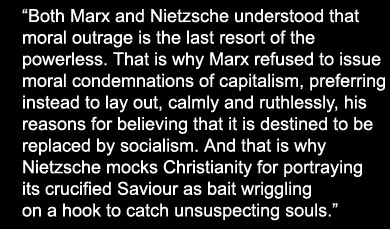Before long they saw the towers and flags of Dictionopolis sparkling in the sunshine, and in a few moments they reached the great wall and stood at the gateway to the city.
Before long they saw the towers and flags of Dictionopolis sparkling in the sunshine, and in a few moments they reached the great wall and stood at the gateway to the city.
Chiitaanibah Johnson of California State University, Sacramento says she was disenrolled from her U.S. History class for disagreeing with her professor over the existence of North American genocide.
The defining mark of the state is authority, the right to rule. The primary obligation of man is autonomy, the refusal to be ruled. It would seem, then, the there can be no resolution of the conflict between the autonomy of the individual and the putative authority of the state.
The fundamental assumption in moral philosophy is that men are responsible for their actions. From this assumption, it follows necessarily, as Kant pointed out, that men are metaphysically free, which is to say that in some sense they are capable of choosing how they shall act.

Jean Meslier
From the most remote period theology alone regulated the march of philosophy. What aid has it lent it?
This is going to be a couple of parts, but I’m going to try to tie them all together, in time. I’ve chosen a “selection plus commentary” approach for these sermons, which means I’m almost certainly going to be dropping spoilers about the future pieces of text. Since it’s philosophy, not thriller fiction, I think that’s OK. On with the sermon:

– Robert Paul Wolff
Politics is the exercise of the power of the state, or the attempt to influence that exercise. Political philosophy is therefore, strictly speaking, the philosophy of the state. If we are to determine the context of political philosophy, and whether indeed it exists, we must begin with the concept of the state.
This clinic is going to be a bit less prescriptive and more theoretical.

Is this the right room for an argument?
We are going to look at a powerful technique for pulling your opponent into a discussion-ending quagmire; it’s the rhetorical equivalent of sneaking off the battlefield under cover of darkness.
Saying something nasty and following it with “I’m just joking” is a form of verbal abuse that’s passive-aggressive. I.e: it’s semi-concealed aggression, intended to give the target pause as to whether or not they can successfully counter-attack.

Is this the right room for an argument?
It’s a technique that can be employed in a strategy of verbal abuse but succeeds if it’s fairly consistent, and only then against unsophisticated targets.
This episode of “Ask the Strategic Genius” is about logistics and the 2nd Amendment: two things you typically will not find connected in public discourse. Time to cure that!
“Amateurs talk about tactics, professionals study logistics” – Napoleon Bonaparte*
